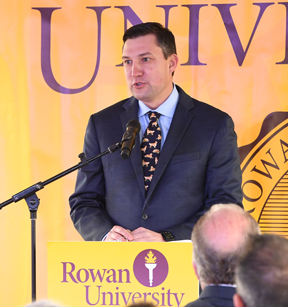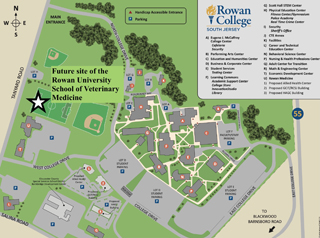Matt Edson

Photo by Craig Terry, Rowan University
Dr. Matthew Edson is founding dean of the Rowan University School of Veterinary Medicine, slated to open in 2025 with 60 students.
Options for veterinary education in the United States could jump from 33 to 36 programs within the next few years, with Rowan University School of Veterinary Medicine in New Jersey as the first of the newcomers.
Citing rising demand for veterinary care and education, Rowan University will open New Jersey's first veterinary program to at least 60 students by fall 2025, pending a myriad of must-haves: additional funding, construction and a nod from the American Veterinary Medical Association Council on Education, the nation's accrediting body for veterinary education.
A consultative site visit by the COE, an initial step in the accreditation process, is tentatively planned for 2023.
Efforts are underway in West Virginia and Arkansas, also, to potentially establish veterinary programs. Like New Jersey, neither of those states has its own veterinary school, and proponents cite a need for veterinarians in underserved regions around the country.
Rowan University is a midsized public research institution with medical colleges that confer both Doctor of Medicine and Doctor of Osteopathic Medicine degrees. Its campaign to add a Doctor of Veterinary Medicine degree is moving quickly.
In November, the state Legislature allocated $75 million to construct the school's main academic and clinical facility on the campus of Rowan College of South Jersey-Gloucester, a community college in Sewell. Rowan College is a sister institution to Rowan University. Sewell is about five miles northwest of Rowan University's main campus in Glassboro.
A half-hour's drive from Sewell is the University of Pennsylvania School of Veterinary Medicine in Philadelphia, which draws heavily from its neighboring state. Residents of New Jersey comprise more than 30% of Penn Vet's class of 2025, outnumbered only by residents of Pennsylvania.
In an announcement last week of their plans, Rowan University officials did not mention their state's proximity to Penn but underscored what they suggested is a scarcity of veterinary programs on the East Coast — by their count, just five of the nation's 33.
Furthermore, they said, there's a growing demand for more practitioners: "In 2006, the Association of American Veterinary Medical Colleges predicted a shortage of 15,000 veterinarians in the nation within 20 years," a university press release states.
The new school will bring "innovation in curriculum delivery, cost efficiency, tuition affordability and job readiness," according to Rowan University President Ali Houshmand. "Our curriculum will emphasize developing career-ready professionals to address shortages of animal health care providers in New Jersey and throughout the United States."
Members of the Veterinary Information Network, an online community for the profession and parent of the VIN News Service, had varied responses to the Rowan announcement.
"I hate all these new vet schools popping up, presumably they assume they can make a profit," commented Dr. Amanda Guthrie in a message board discussion.
Since 2013, five new programs have opened in the U.S., a rate of growth not since since the 1970s, when eight programs debuted.
Others reacting to Rowan's plans reflected on benefits that an in-state option might afford aspiring veterinary students in New Jersey, considering that a four-year veterinary degree can cost between $36,000 and $72,000 a year in tuition and fees alone for out-of-state students. (Some programs permit out-of-state students to become residents after their first year.)
New Jersey lawmakers in the past have tried to blunt some of the expense of attending school out of state. Under a now-expired program by the New Jersey Higher Education Student Assistance Authority, the state spent more than $1.3 million to reserve 104 seats at several veterinary schools for New Jersey residents, offsetting their tuition, on average, by $13,000.
Citing a need to do something for aspiring veterinarians in New Jersey, VIN student debt consultant Dr. Tony Bartels wrote in the discussion, "It's about time they have an in-state option.
"Sure would be nice, though," he continued, "to see the new dean and associate dean mention something about the cost of attendance in all those fluffy words they've currently put up about the demand for a veterinary education — since, you know, student debt is kind of a big deal, too."
Dr. Matthew Edson, the program's founding dean, said it's too early to say what Rowan's veterinary school tuition will be. "But I think in general, we do not have a program in the state, so proximity to other schools aside, we've never really had the ability to offer New Jersey students the in-state option and the in-state tuition that comes with that," he said. "I think that's a big motivator for this program."
He described another driver — the need for more veterinarians and, therefore, more veterinary education — as "cyclical."
"If you asked 20 years ago, even maybe 10 years ago, if we needed more vet schools, there was almost a universal opinion that we didn't and that there weren't enough jobs for the people that we had," Edson said. "And if we asked people today, everyone's desperate to hire veterinarians and thinks that we need more.
"Certainly, that little snapshot in time is not a reason to [open a new veterinary college] because we're not always going to be in that position," he acknowledged. "But sometimes our immediate frustrations take a front seat."
Unexpected trajectory
Map 320

Map courtesy of Rowan University
The Rowan University School of Veterinary Medicine will be housed on the Rowan College of South Jersey campus in Sewell, next to the School of Osteopathic Medicine.
Click here for a larger view
At age 38, Edson might be the youngest dean in the country, and he isn't a career academic.
In the decade since earning his veterinary degree from Kansas State University, Edson's career has been rooted in mixed animal private practice. The lifelong New Jersey resident started out doing ambulatory work — "I had a pickup truck and some medical supplies and my dog" — and has taught some science courses to undergraduates at a local community college.
He and his wife, Jenna, a social worker, live with "lots and lots of pets" in Tuckerton, where he owns Rancocas Veterinary Associates, a busy six-doctor practice with a second location in Mt. Laurel. He periodically volunteers on a site team of the AVMA COE, visiting programs around the world to assess whether they meet the accrediting body's standards.
In late 2019, Edson was asked to consult on a project for the city of Vineland, then in a partnership with Rowan to study whether opening a veterinary program in the New Jersey municipality might be feasible. Edson declined and Rowan's partnership with Vineland dissolved.
But plans for a veterinary program continued. On June 1, Rowan hired Edson to lead the program now in development. Aspiring to retain some semblance of practice ownership, Edson is squeezing in clinical appointments even as he transitions to academia.
"This isn't the path I planned for my career," Edson said. "But as much good as we do in general practice, the ability and opportunity to get however many veterinary students graduated to contribute to society ... it was not something I could pass up. Veterinary medicine is what I love."
Asked whether Rowan will employ a distributive model for clinical training, which involves sending veterinary students to participating practices off campus, Edson said he's aiming for a "hybrid model" that incorporates a small but traditional teaching hospital.
"We're not going to have the 200,000-square-foot teaching hospital with everything under the sun, and we're certainly not 100% distributed learning with no on-site facilities-type program," he said. "We're planning a smaller small-animal teaching hospital that's going to be co-located with our instructional facility on the school campus of RCSJ. It's going to offer more services tailored to the economic needs of the area — so things that are typically put in a more commercial referral type hospital facility."
Aspects of training for which there is less economic need in the region are those for which the school will seek distributed partners, he said: "For example, New Jersey is not a giant dairy state. We just don't have enough cows in this area."
West Virginia mulls veterinary education
West Virginia's call for in-state veterinary education is strikingly similar to that of New Jersey, with a twist: The state has among the fewest veterinarians per household in the country, with no licensed veterinarians in at least eight of the state's 55 counties, according to a report by the West Virginia Board of Veterinary Medicine.
"One advantage of forming a college of veterinary medicine in West Virginia is that students from this state would have the opportunity to earn a DVM degree with significantly less debt by attending an in-state school; although average salaries may be lower than surrounding states, a reduction in debt could improve the possibility that they will remain in West Virginia after graduation."
That's according to a report prepared for lawmakers and recently presented to the Joint Committee on Government and Finance. Last year, a Special Interim Committee on Higher Education was established to explore the viability of opening a veterinary program in West Virginia. It found that the state already spends more than $1 million a year on tuition subsidies for 52 aspiring veterinarians studying out of state and faces big increases in pet ownership as well as an aging population of veterinarians.
The committee counted 450 veterinarians licensed to practice in the state in 2019, or one veterinarian for every 3,900 citizens. AVMA figures from 2019 put the national ratio of veterinarians to population at one per 2,827.
Officials are looking to keep the state's money and talent in West Virginia.
So far, no West Virginia institutions have been proposed as the home for a new veterinary college, but many have pre-veterinary programs: Alderson Broaddus University; Bethany College; Davis & Elkins College; Marshall University; Shepherd University; West Virginia University; and West Virginia Wesleyan College.
"Many universities in West Virginia have the capability to produce qualified students for veterinary medicine through other undergraduate degree programs including those listed above ..." the report reads.
The report models the makeup of two relatively new programs — Midwestern University in Glendale, Arizona, and Texas Tech University in Amarillo, Texas — in its prospectus, which weighs the merits of hosting a traditional veterinary teaching hospital on campus versus farming students to private practices during their clinical year. It quotes AAVMC data: "The average CVM budget for 2020-2021 is $89,456,649, with the biggest chunk (35%) going to teaching hospitals."
So it's not surprising, the report says, that among six of the newest veterinary programs in the United States, five do not have a teaching hospital and instead have adopted a distributed learning model for clinical training. "By implementing a hybrid distributed model of education perfected by the CVM, Texas Tech will avoid one of the largest cost-centers that burden traditional models of veterinary education: the teaching hospital," the report stated.
The outlier is Midwestern, a private institution that's among the nation's most expensive veterinary programs at nearly $60,000 a year in tuition. It has an animal health institute on campus that includes a companion animal clinic, diagnostic pathology center and an equine/bovine center for clinical rotations.
Pandemic slows plans at Arkansas State
Another up-and-coming veterinary program could emerge at Arkansas State University. A feasibility study in partnership with for-profit Adtalem Global Education Inc., formerly DeVry Education Group and owner of Ross University School of Veterinary Medicine in the Caribbean, was ordered in January 2020, before the novel coronavirus spread throughout the world.
"While the global pandemic slowed progress, our discussions with our potential partner to create a College of Veterinary Medicine at Arkansas State are ongoing. Hopefully, I will have more information in the near future," said Donald Kennedy, associate dean and professor of animal science in the College of Agriculture.